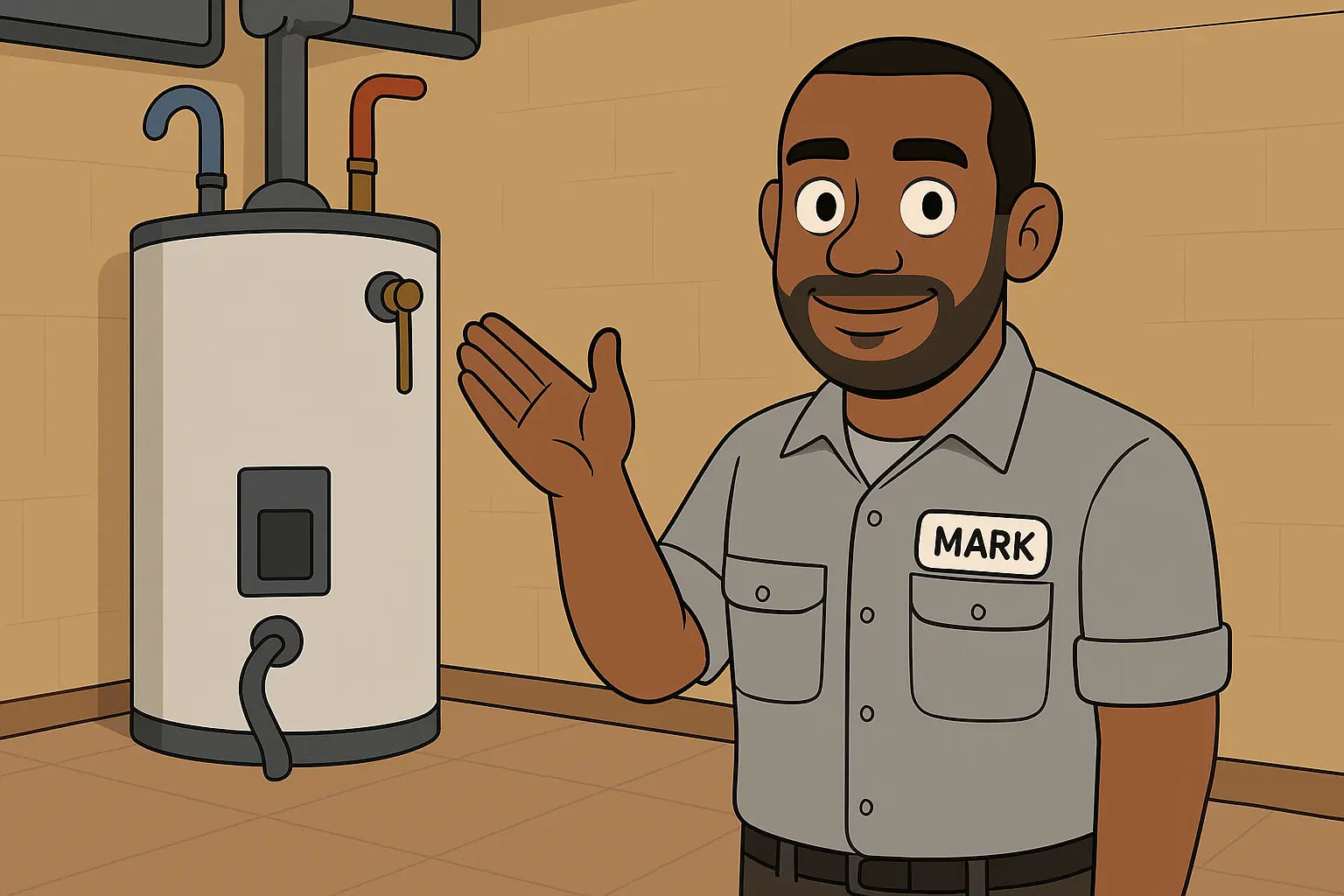From Mark’s Garage 📦
Hey folks! Mark Callahan here — your neighborly tool guy and the voice of reason when it comes to home fixes. You know me: I don’t believe in replacing things before their time, but I do believe in knowing when the time is near. And nothing wrecks a weekend faster than a water heater failure in the middle of your kid’s bubble bath or your one shot at peace and quiet. 😤
So let’s dive into today’s big question: how long should a 50–60 gallon electric water heater really last — and how can you tell when it’s ready to clock out?
The Typical Lifespan of a 50–60 Gallon Electric Water Heater ⏳
A well-installed, regularly maintained electric water heater in the 50–60 gallon range usually lasts 10 to 15 years. Some can even stretch to 20 with a little TLC.
But like your car, your joints, or that old lawnmower you keep meaning to replace, wear and tear is inevitable.
Factors that affect lifespan:
-
Water quality (especially hardness and sediment levels)
-
Usage habits (number of people in your household)
-
Installation quality
-
Preventative maintenance routines
-
Brand & model build
According to the U.S. Department of Energy, water heaters are the second-largest energy user in a typical household — so keeping yours efficient and reliable isn’t just smart, it’s economical.
👉 Energy.gov: Water Heating
The “Uh-Oh” List: Signs Your Water Heater Is Nearing the End 🧯
Let’s break down some of the clearest signs your water heater is reaching retirement age.
1. Rust-colored hot water
That rusty tinge coming out of your hot tap? It could be your tank corroding from the inside. Steel eventually rusts — and if the anode rod is worn down, there's nothing left to stop it.
2. Strange noises (popping, rumbling, cracking)
Loud noises usually mean sediment has built up and hardened at the bottom of the tank, which reduces efficiency and stresses the tank lining.
👉 Nick's Plumbing covers this well
3. Inconsistent water temperature
If your hot water goes cold fast or fluctuates, it may be a failing thermostat, heating element, or internal scale build-up.
4. Leaks around the base
If water is pooling around your unit, and it’s not from condensation or a pipe connection, that’s probably a sign the tank is cracked. And sadly, there’s no patching that up.
5. Age itself
If your unit is pushing 12–15 years, start budgeting for a replacement even if it seems to be working fine. Most manufacturers list the manufacture date on the label — or you can decode it from the serial number.
Extending the Life of Your Water Heater 💡
Here’s what I recommend doing at least once a year to extend the life of your heater:
-
Flush the tank
Sediment build-up shortens heater life and kills efficiency. Draining and flushing the tank clears out scale and sludge.
👉 Check this guide from My Health Alberta -
Inspect the anode rod
This sacrificial rod slows down rusting inside the tank. Replace it every 3–5 years. -
Check the TPR valve
That’s the Temperature & Pressure Relief valve — it’s a safety feature. Make sure it’s not stuck or leaking. -
Insulate the tank
Tank jackets reduce standby heat loss and keep the unit from working harder than it needs to. -
Install a water softener
If you’ve got hard water, a softener system will save your water heater’s guts from scale build-up.
Is It Worth Repairing an Aging Heater? 🧮
If your heater is over 10 years old and showing symptoms, think twice about repairs. A $300 part replacement on a $600 heater doesn’t always make sense. That money may be better spent on a brand-new high-efficiency unit with lower operating costs and up-to-date safety features.
If you’re shopping around, you can compare modern options right here:
👉 Shop 50–60 Gallon Electric Water Heaters
Smart Replacements: What to Look For 🔍
When you’re ready to upgrade, here’s what I tell my clients (and my sister-in-law):
-
First-hour rating (FHR): How much hot water it can deliver in one hour
-
Recovery rate: How fast it reheats
-
Energy efficiency (UEF rating): Higher UEF means lower monthly costs
-
Digital controls or Wi-Fi capability: For convenience and smarter energy use
Check out Consumer Reports' breakdown of best water heater features here:
👉 Consumer Reports: Water Heaters Buying Guide
Final Thoughts from Mark’s Corner 🧰
Look — nobody wants to be elbow-deep in a surprise plumbing disaster when it’s totally avoidable. Your 50–60 gallon electric water heater is a silent workhorse, but like all good things, it doesn’t last forever. Keep an eye on those warning signs, run your maintenance checklists, and don’t be afraid to retire that old tank before it becomes a bigger problem.
When you’re ready to upgrade, I’ve got your back — check out this solid lineup of electric water heaters that are reliable, affordable, and ready to take the heat:
👉 https://thefurnaceoutlet.com/collections/water-heaters-electric-50-60-gallons
Need more installation and troubleshooting tips for your 50-60 gallon water heater? Visit my ultimate guide right here!
Until next time, keep it hot and keep it smart!
– Mark, your go-to HVAC tech 🔧







